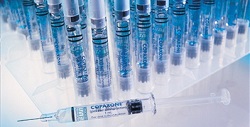 |
Teva's ($TEVA) long-acting version of multiple sclerosis treatment Copaxone has surpassed most analysts' expectations, with management recently reporting that 51% of patients have already converted. But as competition to the original looms, will Teva consider making a hard switch--that is, discontinuing off-patent Copaxone to push patients toward the protected version--in a quest to maintain market share? The short answer: Yes, but not just yet.
As CEO Erez Vigodman put it on last week's second-quarter conference call, the switch from the 20-mg formulation to the 40-mg formulation is "a delicate dance." The Israeli company is targeting a 65% conversion target by year end. Now, at 22 weeks postlaunch, the switch rate is slowing, but the new Copaxone is still making gains. That means Teva can afford to wait on a hard switch and avoid disrupting patients, Jon Congleton, SVP and central nervous system head, told analysts.
But that doesn't mean the hard switch isn't coming. It's "not something that we're looking to do immediately, but there will come a point in time where there will be enough of a conversion over that we'll certainly entertain that just from a logistic and simplicity standpoint," he said on the call.
Teva has good reason to want to keep sales in the Copaxone family, with the med currently chipping in 42% of this year's profits, CFO Eyal Desheh said last week. And hard switches have shown they have the potential to do just that.
Last year, Leerink Partners analyst Jason Gerberry said Warner Chilcott's hard switch of patients from anti-inflammatory Asacol to the delayed-release version Delzicol "could limit the generic opportunity" for the elder drug.
And Forest Labs ($FRX) is about to undergo a similar switch: The company will stop selling Namenda IR this month and focus its future sales efforts on Namenda XR, a move that Leerink Partners analyst Seamus Fernandez says would be the company's "most tangible long-term revenue upside opportunity" given Forest's "relatively muted new product launches" and the delay of its LAMA/LABA combo product.
For now, Teva will "continue to evaluate carefully when the magic moment is," Vigodman said--and that may depend on when generic competition to Copaxone launches. Two copycat teams--Novartis' ($NVS) Sandoz and Momenta Pharmaceuticals, and Mylan ($MYL) and India's Natco Pharma--say they've got rivals ready to go. But if they roll them out, they risk paying damages to Teva if the Petah Tikvah-based drugmaker wins its upcoming Supreme Court appeal in a patent infringement case.
And the longer they stay away, the more open payers might be to covering new Copaxone, Teva figures--and the less disruption a hard switch would cause for patients.
"MEDACorp MS specialists have told us [about] 33% of their patients cannot get reimbursement for the 40mg version," Gerberry wrote in a recent note to clients. However, management "believes reimbursement for the 40mg strength will improve as payers come to realize a generic may never come to market."
Special Reports: Top 10 Drug Patent Losses of 2014 - Copaxone | Top 10 Generics Makers by 2012 Revenue - Teva